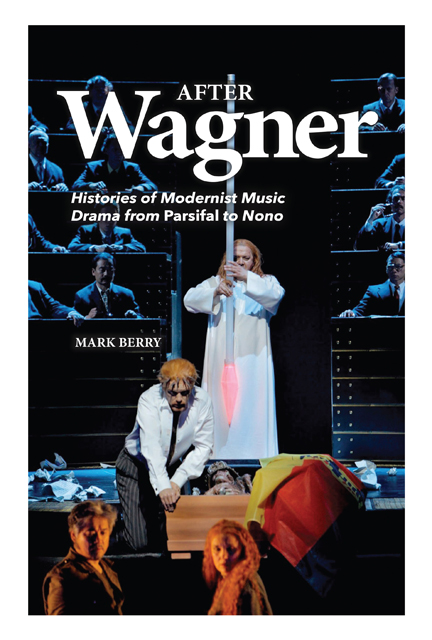Book contents
- Frontmatter
- Contents
- List of Music Examples
- Acknowledgements
- Dedication
- Introduction: ‘After Wagner’
- Part I In the Shadow of German Idealism: From Parsifal to Capriccio
- Part II Composition after the Second World War: From Germany to Italy, and Back Again?
- Part III Performance and the Fruitful Instability of the Work: From Parsifal to Nono
- Bibliography
- Index
8 - Staging Lohengrin, or Not
Published online by Cambridge University Press: 24 February 2023
- Frontmatter
- Contents
- List of Music Examples
- Acknowledgements
- Dedication
- Introduction: ‘After Wagner’
- Part I In the Shadow of German Idealism: From Parsifal to Capriccio
- Part II Composition after the Second World War: From Germany to Italy, and Back Again?
- Part III Performance and the Fruitful Instability of the Work: From Parsifal to Nono
- Bibliography
- Index
Summary
Opera-goers, at least those interested in some form of critical engagement with work and genre, have become wearily accustomed to so much of their ‘experience’ in the opera house standing almost diametrically opposed to their understanding and appreciation of the ‘art’. It is relatively uncontroversial to say that, whatever the realities of, say, nineteenth-century grand opéra might have been, the worlds of corporate entertainment, advertising, fashion, and conspicuous consumption sit uneasily with Wagner, Schoenberg, Nono, et al. Apparently without irony, the 2012 Royal Opera House programme for the Ring devoted its back cover to an advertisement for Barclays Wealth and Investment Management. ‘Wealth. What’s it to you? If wealth means being able to spend time enjoying more rarefied pursuits, we can help.’ To encounter such a description of Das Rheingold was jarring to say the least; the more apposite question might have been, ‘what was “it” to Alberich?’ Yet even Bayreuth has from the outset attracted and catered for audiences utterly inimical to the hopes of the creator of the artwork of the future, and even to the convenor of the gathered congregation of Parsifal.
Opera production, in the sense of staging, has to a certain extent, and especially in certain environments, offered opportunity for revenge, or at least for redress, although even Adorno, in an essay on Bourgeois Opera, was critical of the tendency towards excessive disenchantment. ‘Some of the most authentic operas’, amongst which he suggests Der Freischütz, Die Zauberflöte, and Il trovatore, have ‘their true place’, he writes, ‘in the children’s matinee and embarrass the adult, who imagines himself too sensible for them, simply because he no longer understands their pictorial language.’ A child, attending a performance of Der Freischütz, who found ‘the wolf ’s glen reduced to natural symbolism is right to feel cheated out of the best part’. Perhaps – though it seems as questionable to rule out effective use of such symbolism as to rule out effective, or indeed provocative, naturalism.
Maybe even the idea of redress is too strong, and we should adopt or adapt the admirably humane understanding of Berio, interviewed in 1980:
my ideal public is one with many faces, all bringing different motivations to their encounter with the music.
- Type
- Chapter
- Information
- After WagnerHistories of Modernist Music Drama from Parsifal to Nono, pp. 234 - 250Publisher: Boydell & BrewerPrint publication year: 2014



